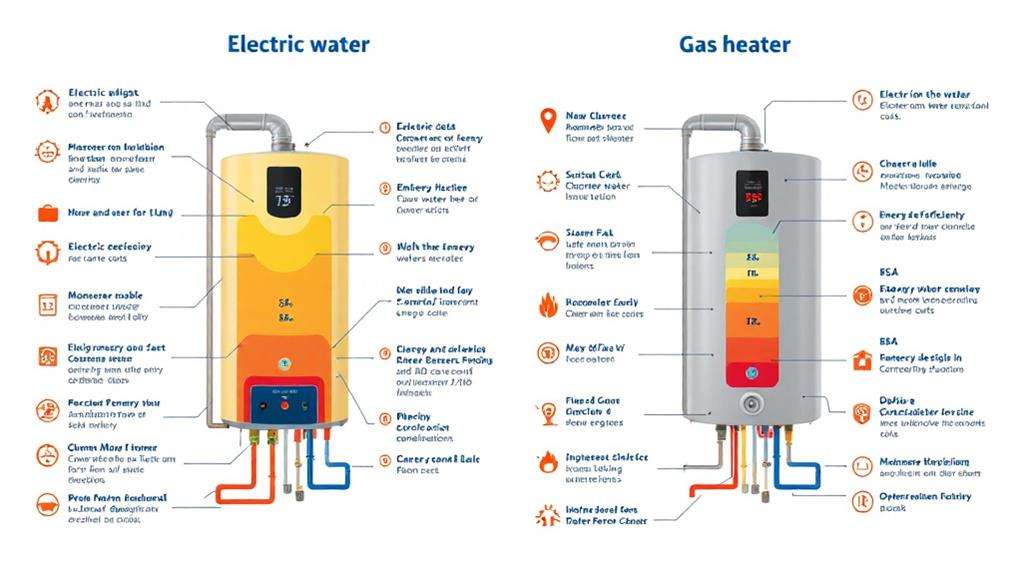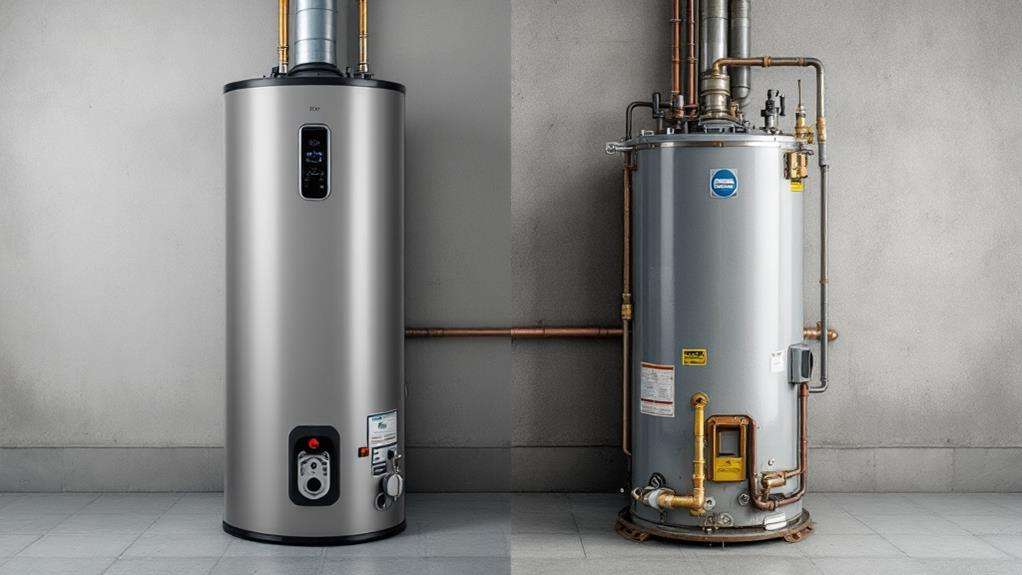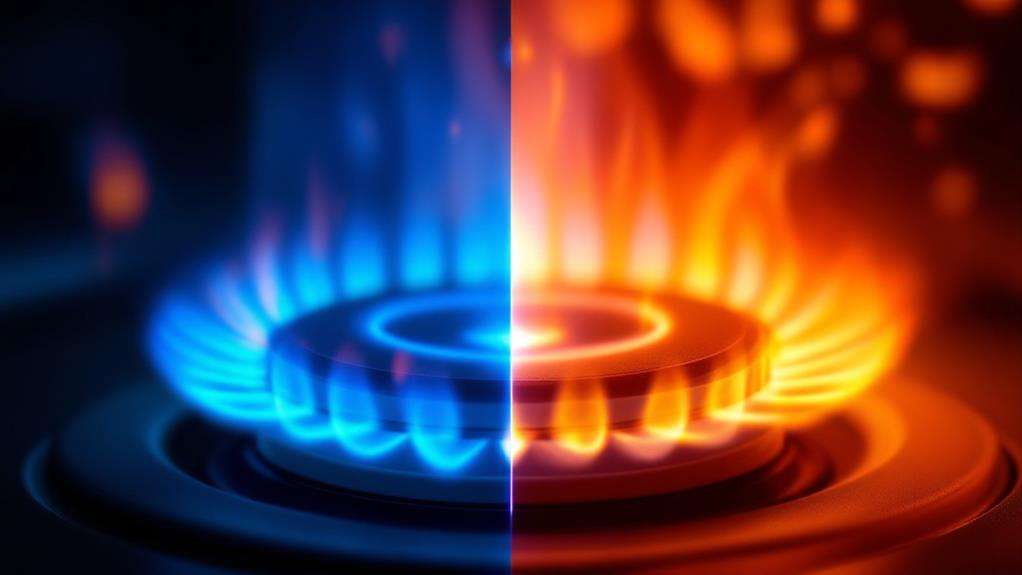Pros and Cons of Electric vs. Gas Water Heaters
When deciding between an electric or gas water heater, you'll want to weigh the pros and cons. Electric models are typically more energy-efficient but have higher operating costs. Gas heaters heat water faster and have lower fuel expenses, but require ventilation and can produce more emissions. Upfront costs also differ, with electric heaters being cheaper to purchase but more expensive to install. Maintenance needs and lifespan should also factor into your decision. Ultimately, the best choice depends on your home's setup, energy needs, and budget. To dive deeper into these considerations, let's explore the details further.
Key Takeaways
- Electric water heaters are typically more energy-efficient, with 90-95% efficiency compared to 50-60% for gas models, making them more environmentally friendly.
- Gas water heaters have faster heating and recovery times, making them better suited for households with high hot water demands, but they produce higher carbon emissions.
- Electric water heaters generally have lower upfront costs, while gas models often have higher initial prices but may be less expensive to operate due to fluctuating electricity prices.
- Maintenance requirements differ, with electric heaters being easier to maintain, while gas models may need more frequent servicing, such as checking the pilot light and cleaning the flue.
- Safety considerations are crucial, as gas water heaters require proper ventilation to prevent carbon monoxide buildup, while electric units pose fewer fire and explosion risks.
Energy Efficiency Comparison
How energy-efficient are electric and gas water heaters? When it comes to energy efficiency, electric models typically outperform their gas counterparts. Electric heaters convert nearly all their energy input into heat, while gas heaters lose some energy through the exhaust. This makes electric heaters about 90-95% efficient, compared to 50-60% for gas. However, the energy consumption factors differ - electricity tends to be more expensive per unit, but gas has higher carbon emissions. So the sustainability implications favor electric heaters in regions with cleaner electricity grids. That said, gas models can heat water faster and may be more economical if you have access to cheap natural gas. Ultimately, your energy efficiency needs and budget will determine the best fit. No matter which you choose, regular maintenance is key to keeping your water heater operating at peak efficiency.
Installation and Replacement Costs
The installation and replacement costs of electric and gas water heaters can vary significantly. The upfront purchase price of an electric water heater is generally lower than a gas counterpart. However, you'll need to factor in hidden installation fees, such as the cost of running new electrical lines or upgrading your home's electrical panel. On the other hand, gas water heaters often have a higher initial price tag but may be less expensive to install, as they can typically use existing gas lines.
When it comes time to replace your water heater, the costs can also differ. Electric units are generally easier and quicker to replace, which can save on labor expenses. Gas heaters may require more complex work, like adjusting the gas line and venting system. Ultimately, the installation and replacement costs will depend on your home's specific setup and any necessary modifications. Understanding these factors can help you make an informed decision when choosing between an electric or gas water heater.
Ongoing Operational Expenses

While the initial installation costs of electric and gas water heaters can vary, the ongoing operational expenses are also important to consider. With electric water heaters, you'll rely on access to the power grid, which means your monthly costs can fluctuate based on utility pricing. This can make budgeting a bit tricky, as electricity rates can rise and fall unpredictably. In contrast, gas water heaters often have more stable operational costs, as natural gas prices tend to be less volatile than electricity. However, if you live in an area with limited gas infrastructure, the ongoing fuel costs for a gas water heater may be higher. Ultimately, evaluating your local utility rates and considering your home's energy needs will be crucial in determining which type of water heater makes the most financial sense for your household in the long run.
Heating Speed and Recovery Time
Heating speed and recovery time are other key factors to consider when choosing between electric and gas water heaters. Generally, gas water heaters have a faster heat-up time and shorter recovery period compared to their electric counterparts. The rapid combustion of gas allows the water to heat up quickly, usually reaching the desired temperature in less than an hour. This is especially beneficial if you have a high demand for hot water, as the gas heater can quickly replenish the supply.
In contrast, electric water heaters take longer to heat up the water, typically requiring 1-2 hours to reach the target temperature. However, they can maintain a more consistent water temperature throughout the day, ensuring a reliable and steady supply of hot water. This temperature consistency is advantageous if you have a household with varying hot water needs throughout the day.
Ultimately, the choice between electric and gas water heaters will depend on your specific hot water requirements and preferences regarding heating speed and recovery time.
Lifespan and Maintenance Requirements

Another key consideration when choosing between electric and gas water heaters is their lifespan and maintenance requirements. Electric water heaters are generally more reliable and have a longer lifespan, typically lasting around 10-15 years with proper maintenance. On the other hand, gas water heaters may require more frequent repairs due to their more complex mechanics, with a lifespan of around 8-12 years. However, the repair frequency for gas water heaters can vary depending on the quality of the unit and the local climate.
When it comes to maintenance, electric water heaters are generally easier to maintain, requiring periodic flushing to remove sediment buildup. Gas water heaters, on the other hand, may need more frequent maintenance, such as checking the pilot light, inspecting the burner, and cleaning the flue. Proper maintenance is crucial for both types of water heaters to ensure their longevity and optimal performance.
Environmental Impact and Emissions
Environmental considerations play a crucial role when evaluating electric and gas water heaters. Electric water heaters have a lower environmental impact, as they don't produce any direct greenhouse gas emissions during operation. In contrast, gas water heaters emit carbon dioxide and other pollutants, contributing to your carbon footprint. While the environmental impact of electricity production varies depending on the energy mix in your region, electric heaters generally have a smaller overall environmental footprint.
Additionally, electric water heaters don't pose a risk of water pollution from gas leaks or spills. Gas heaters, on the other hand, can potentially contaminate water sources if they malfunction. This is an important consideration, especially if you live in an area with strict environmental regulations or sensitive ecosystems.
When it comes to environmental impact and emissions, the clear winner is the electric water heater. Its lack of direct emissions and lower risk of water pollution make it the more eco-friendly choice for your home.
Safety Considerations

When it comes to safety, how do electric and gas water heaters compare? Electric water heaters generally pose fewer potential fire hazards since they don't involve the combustion of fuel. However, gas water heaters require proper ventilation to prevent the buildup of dangerous carbon monoxide, which can be a serious health risk if not addressed.
With an electric unit, the main safety concern is the risk of electrical fires or shocks. While these are relatively uncommon, it's crucial to ensure proper installation and maintenance to mitigate these risks. On the other hand, gas water heaters need to be vented outside to the outdoors to safely expel exhaust and prevent carbon monoxide poisoning. Failing to provide adequate ventilation can lead to a potentially life-threatening situation.
Ultimately, both electric and gas water heaters can be safe when installed and used correctly. But gas units demand a bit more diligence when it comes to ventilation requirements to ensure your family's wellbeing.
Space and Venting Requirements
Proper space allocation and venting considerations are crucial when selecting either an electric or gas water heater. Electric models don't require any venting, making them a convenient choice for tight spaces. On the other hand, gas water heaters need proper venting to safely expel combustion byproducts. You'll need to factor in vent configuration options, such as direct vent, power vent, or atmospheric vent, as each has unique installation requirements.
Spatial planning considerations are also essential. Electric units are typically more compact, allowing for flexible placement. Gas models, however, demand more square footage to accommodate the heater and its venting system. Ensure you have enough clearance around the unit for proper airflow and maintenance access. Additionally, the vent piping must be routed effectively to the exterior, which may impact your floor plan. Careful measurement and layout are vital to ensure your new water heater fits seamlessly in your home.
Suitability for Different Home Types

The suitability of electric and gas water heaters can vary depending on the type of home you have. If you live in a mild climate, an electric water heater may be the better choice as it has a smaller climate impact and is generally more energy-efficient. However, in colder climates, a gas water heater may be more suitable, as it can heat water more quickly and efficiently.
The layout of your home can also play a role in determining the best option. If you have limited space, an electric water heater may be the better fit, as they tend to be more compact than their gas counterparts. Conversely, if you have ample space, a gas water heater might be the more practical choice, as they can offer larger capacity and faster recovery times.
Ultimately, considering your home's climate and layout will help you determine the most suitable water heater for your needs.
